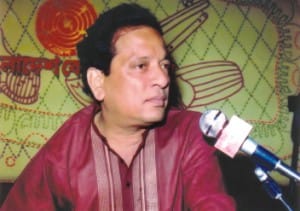Probal Chowdhury: Singing of Liberation

Probal ChowdhuryPhoto: File Photo
Renowned vocalist and artiste of Swadhin Bangla Betar Kendra Probal Chowdhury passed away in the early hours of last Saturday. His demise cast a pall of gloom in the port city as well as across the country. Family members and admirers expect the state to give due honour to Probal as well as support artistes during their lifetime.
Probal's songs will live on in the minds of his huge audience. Among his memorable songs are: "Bhebonago ma tomar chhelera hariye giyechhe," "Jiboner eki porajoy ashar boshoti bhengey jaye," "Lokey jodi mondo koy sheto nohey porajoy," "Ami manusher moto banchte cheyechhi," "Amar shajano bashar" and "Dhanyo hoyechhi ami dhanyo."
“The government hardly takes responsibility or extends a helping hand to artistes during their times of crisis in our country,” Probal's son Dr Ranjan Chowdhury quoted his father.
Ranjan said, “We expect proper evaluation of the artistes when they are alive. The state should honour and support artistes like my father, who as a singer of the Swadhin Bangla Betar Kendra, is entitled to the state honour accorded to freedom fighters.”
"Our television channels focus on a few artistes repeatedly while a number of talented artistes of those days escape attention," said Probal's elder sister Kalyani Ghosh, as she recalled the golden days when she sang along with her brother from the Swadhin Bangla Betar Kendra in 1971.
Probal Chowdhury, one of the notable singers of the '70s, was born on May 20, 1947 at Rahmatganj in Chittagong and was sixth among the five sons and five daughters of Manmohan and Lilabati Chowdhury.
Growing up in a cultural atmosphere, Probal and three of his sisters became a vibrant presence in the port city's cultural arena. Probal's younger sisters Uma Khan and Purnima Chowdhury also earned a reputation as singers. Lilabati Chowdhury, who was also a good singer, was a constant source of encouragement to her children.
Probal retired as an assistant manager of Bangladesh Chemical Industries Corporation in Chittagong in 2004. However, all through he kept in touch with music and raised his offspring to follow the same path.
Probal's sons Tapas Chowdhury and Dr Ranjan Chowdhury, a trader and doctor respectively, are also accomplished singers.
Probal's song was aired on the radio first in 1966. He had been an artiste of special grade at Bangladesh Betar (radio) until his death, recalled his sister Kalyani Ghosh.
Inspired by artiste Abdul Jabbar, Probal sang for Swadhin Bangla Betar Kendra for the first time in June 1971. Probal also excelled in patriotic songs, gano sangeet, ghazal and Rabindra Sangeet and earned a name as a composer and music director as well, she asserted.
Probal enthralled audiences of Voice of America and Akashbani Calcutta and visited several countries including the UK with a cultural team representing the country on several occasions.
He received several awards for his songs in the country and abroad. The awards included The New York Drum Society Award (1984), The Asian Cultural Academy Award (1987), Zia Smriti Award (1988), Muktijoddha Sangsad Award (1989), Amader Pathshala Award (2004) and Abasar Shilpi Sammanana (2007).
Probal sang around 7,000 songs and lent his voice for over 50 films in his lifetime. He sang in 10 audio albums, including five solos.
Right from his childhood, he showed a penchant for music, said family sources, who added that he took first singing lesson from his mother Lilabati and later, from the late Nripen Chowdhury, late Mohonlal Das, Mihir Nandi, sister Kalyani Ghosh, Anwar Chowdhury and other renowned musicians.

 For all latest news, follow The Daily Star's Google News channel.
For all latest news, follow The Daily Star's Google News channel. 



Comments